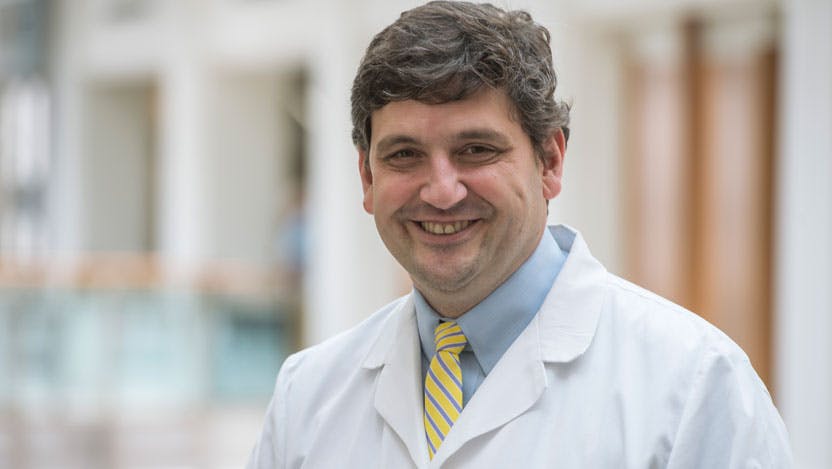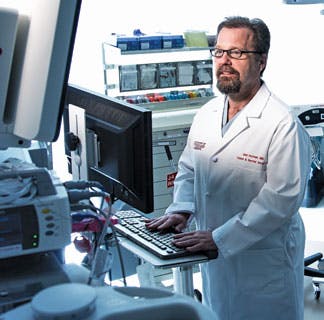Groundbreaking study may change treatment approach for up to 10% of colorectal cancer patients

A University of Chicago Medicine Comprehensive Cancer Center researcher calls a new clinical study a “historic” step in the treatment of an aggressive form of metastatic colorectal cancer.
The Phase III Beacon CRC Trial – featuring a life-extending targeted drug trio and duo as an alternative to current therapies – “absolutely changes the standard of care and offers a new way to treat patients,” said UChicago Medicine Center for Advanced Care at Orland Park was one of the sites enrolling participants.
All patients with metastatic colorectal cancer should be tested for BRAF mutations in the wake of the Beacon CRC findings.
The randomized, three-arm study followed 665 patients with advanced colorectal cancer (CRC) with a mutation in the BRAF gene. The mutation — called V600E — is found in about one in 10 people with metastatic CRC. “This is a mutation we’ve been targeting globally for many years,” Polite said.
Major health concern
Colorectal cancer is the third most common type of cancer in men – and the second most common in women – in the world, with approximately 1.8 million new diagnoses annually.
According to the American Cancer Society, the lifetime risk of developing CRC is about 1 in 22 men (4.49%) and 1 in 24 women (4.15%). Though the disease is highly preventable, an estimated 50,000 Americans die of colorectal cancer each year. The median age at diagnosis for colon cancer is 68 in men and 72 in women; for rectal cancer, it's 63 years for both sexes. Treatment plans may include a combination of surgery, immunotherapy, radiation therapy and chemotherapy.
Despite major improvements in overall CRC survival rates, the 5% to 10% of patients with a BRAF mutation face a grim prognosis. The median survival rate is often a year or two less than for patients who do not have the mutation, a fact that galvanized researchers to join this global study.
Hope for extended life
Offering patients hope for living longer has been driving the research community to find new treatments for the most aggressive cancers. For this trial, one group of patients received the triple-drug combination of encorafenib (a BRAF inhibitor), binimetinib (a MEK inhibitor) and cetuximab (an anti-EFGR antibody). The first two drugs are taken orally and the third is administered by IV.
The second group received the double-drug combo of encorafenib and binimetinib. The control group underwent their investigator’s choice of chemotherapy regimen with the addition of cetuximab alone.
The study found that the combination therapies extended the life of patients with the deadly disease whose tumors had grown on prior chemotherapy. Subjects treated with the triple-drug combination lived 9 months vs. 5.4 months in the control group. The median overall survival in the doublet-therapy group was 8.4 months. Disease progression occurred at 4.3 months for patients in the triplet group, 4.2 months in the doublet group, and at 1.5 months in the control arm.
Side effects occurred in 58% of patients in the triplet-therapy group, in 50% of the doublet-therapy group, and in 61% of the control group. Adverse reactions included fatigue, nausea and rash.
While the triple-drug combination is the most effective, the double-dose regimen “works better than anything we’ve had before, and is a reasonable alternative to people who can’t tolerate the triple-drug,” said Polite.
Kopetz presented the findings July 6, 2019, at the European Society for Medical Oncology (ESMO) 21st World Congress on Gastrointestinal Cancer in Barcelona, Spain. The New England Journal of Medicine published the results on October 24, 2019.
The study “reflects a rational combination to address the vulnerabilities unique to this tumor,” Kopetz stated in a news release. “We are encouraged to see a meaningful improvement in outcomes with this new regimen.”
Stopping falling dominos
The National Cancer Institute defines chemotherapy as treatment that uses drugs to stop the growth of cancer cells, either by killing the cells or by stopping them from dividing. The Beacon CRC trial is billed as an alternative to chemo.
The drug combos inhibit several key tumor-friendly checkpoints in the epidermal growth factor receptor (EGFR) pathway. In short, the drugs target different parts of the signaling pathway in cancer cells to stop the cancer cells from dividing.
“Think of the EGFR pathway as a series of dominos,” Polite said. “If, at any point along the signaling pathway, it is left open and unchecked, the domino falls, setting off a chain reaction – and the cancer cells divide and grow. Blocking just one pathway, or keeping one domino from falling, is not helpful; if someone tips the domino behind it, the chain reaction resumes.”
The trick is to prevent enough of the dominoes from falling so that the last one remains standing. The three-drug combination effectively halts the domino effect.
Polite works frequently with national and international oncology experts through the Center for GI Oncology. He is past chair of the American Society of Clinical Oncology (ASCO) Health Disparities Committee and a two-time chair of the ASCO Government Relations Committee. He is a frequent contributor to the Journal of Oncology Practice.
The oncologist hopes the long-term impact of the study will enable early, effective treatment of CRC patients with the BRAF mutation. All patients with metastatic colorectal cancer should be tested for BRAF mutations in the wake of the Beacon CRC findings, he said.
Though the U.S. FDA has yet to approve the triple-drug treatment, the National Comprehensive Cancer Center Network formally recognized it as a therapy option last year.
The BRAF population “is a huge focus in the colorectal world,” agreed Polite, who has adopted this protocol for CRC patients at UChicago Medicine and advocates the double- and triple-drug regimens.
“We have finally found weaknesses in the armor of BRAF-mutant colon cancer," he said. "This provides us a good place to build off of our efforts to improve the survival of patients with this devastating mutation.”

Colorectal Cancer Care
At UChicago Medicine, colorectal cancer care is delivered by a team of experts, including specialists in medical oncology, gastroenterology, colorectal surgery, radiation oncology, genetic counseling and more. Our patients receive holistic care that balances advanced, effective treatment with the goals of preserving bowel function and quality of life.
Learn About Our Colorectal Cancer Care